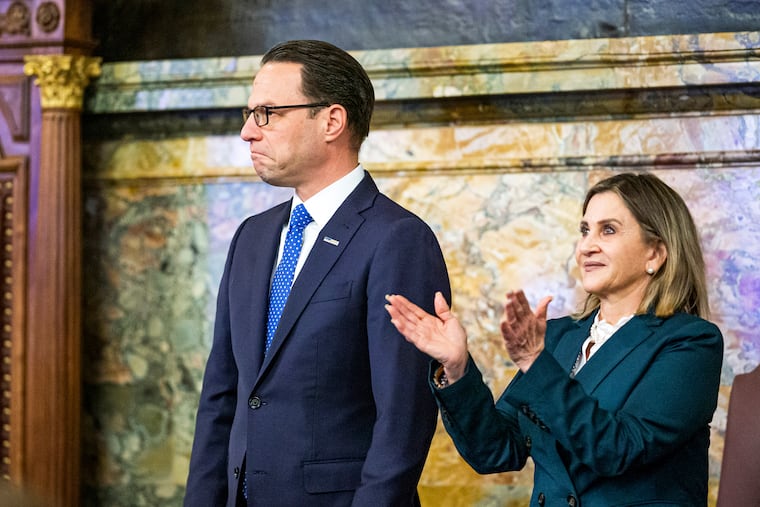Pre-K Counts programs aren’t authorized to open this fall because of Pa. budget impasse
The budget impasse has threatened funding for state-related universities, school districts and libraries. But contracts for Pre-K Counts, which operate on a five-year cycle, ended June 30.

As the new school year approaches, Children’s Playhouse has enrolled 40 children through Pre-K Counts, a state-funded preschool program, at its two South Philadelphia locations.
But earlier this week, the early learning center informed the families of those children that they might need to find another option. The reason: Amid the ongoing state budget impasse, Pre-K Counts programs don’t have contracts to operate.
“They’re left out to dry, making these financial decisions: ‘Do I leave my job? What do I do with my children? I can’t afford childcare now,’” said Damaris Alvarado-Rodriguez, Children’s Playhouse’s director. “These are really difficult times right now that we’re trying to navigate with our families.”
The budget impasse has threatened funding for a host of agencies: from state-related universities, school districts and libraries, to county services for substance abuse, child welfare and mental health.
But it’s not just money that’s in jeopardy for Pre-K Counts, Pennsylvania’s largest preschool program, which in 2021-22 served more than 23,000 at-risk children. Contracts for the programs, which operate on a five-year cycle, ended June 30. The Pennsylvania Department of Education hasn’t awarded new contracts — leaving programs without authorization to operate.
Because funding for the programs and numbers of available slots are determined by the budget, “we’re not able to authorize anything, or send out the award letters,” said Taj Magruder, spokesperson for the department.
“It is a really disappointing process, because all of us at PDE know how important early childhood education is,” Magruder said.
Pennsylvania’s budget has been in limbo amid a battle over taxpayer-funded private school vouchers, which has thrown Harrisburg into partisan gridlock. Republicans have accused Democratic Gov. Josh Shapiro of backtracking on a deal by pledging to veto voucher spending from the state’s $45.5 billion spending plan.
While both houses of the legislature have passed the spending plan, they need to sign it in order for it to become final. The Senate isn’t scheduled to return until Sept. 18.
If Senate President Pro Tempore Kim Ward (R., Westmoreland) “does not reconvene sooner, or until she does, we do not have the ability to disburse critical state and federal funding at this time,” Pennsylvania Education Secretary Khalid Mumin said in a letter to education officials Tuesday detailing funding affected by the impasse, including $28 million to Pre-K Counts providers between July and August.
Mumin said that Shapiro “finds the failure of our full-time state legislature to reconvene and deliver a signed copy of an already-passed budget bill unacceptable and has repeatedly urged the Senate to return to the Capitol immediately, so that he can sign this bill and provide the critical funding needed to support your work.”
In a statement Friday, Ward said that Senate Republicans “are actively negotiating the budget” with Shapiro and “understand the importance of getting the General Appropriations budget to the governor before the school year begins, as well as funding for many organizations.”
“The quickest and best path forward has not changed and that is for Gov. Shapiro to keep his word and sign the budget as passed,” noted Ward, who said the Senate would return in August once negotiations were finalized.
Without clarity on their contracts, however, Pre-K Counts providers have been grappling with how they might operate this fall.
“We’ve been working with our solicitor on that question,” said Tina Viletto, director of community and government relations for the Montgomery County Intermediate Unit, which had 329 Pre-K Counts slots last year. In order to qualify for the program, families must have incomes below 300% of the federal poverty level.
Viletto said the intermediate unit was awaiting more information from the state and didn’t want to cause premature “angst” for families.
Some agencies are making contingency plans. Philadelphia plans to ask the school board on Aug. 17 to authorize borrowing $400 million to maintain payments to employees, charter schools and vendors, including continuing Pre-K programming.
“In the current high-interest-rate environment, borrowing $400 million will be very expensive,” said Christina Clark, a district spokesperson.
Deb Green, executive director of the Parent Infant Center in West Philadelphia, said she “cannot imagine telling our [Pre-K Counts] families that they will not have the program, and nor can I imagine telling teachers they don’t have jobs.”
“So I am stuck with no plan except to make many calls to my legislators and beg that they get this damn budget passed,” Green said. She added that providers have “been through hell these past three COVID years and this is just icing on the cake.”
Alvarado-Rodriguez, of Children’s Playhouse, said she’s been working with her Pre-K Counts families to apply for other childcare subsidies, but it appears only eight of the 40 are eligible.
She’s been urging families to contact lawmakers and share how they will be affected if their classrooms don’t open on Sept. 5. She’s also worried about her staffing, and if she’ll have to lay off teachers.
“We cannot provide services... without any type of guarantee we’re going to get paid,” she said.